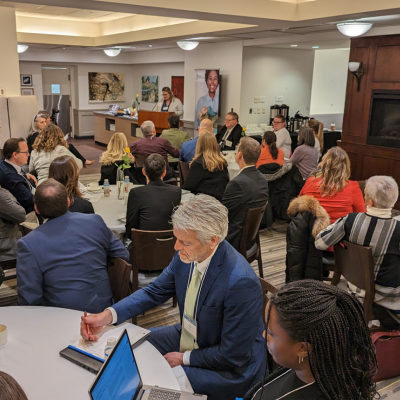Food bankers and Members of Provincial Parliament (MPPs) met at Queens Park recently.
The MPP Breakfast was an opportunity for food banks to meet face-to-face with MPPs to discuss the challenges facing food banks and the people they serve, and to share recommendations on how the Province can work to reduce poverty and hunger in Ontario.
All together, more than 50 food bankers and 34 MPPs, including the Minister of Municipal Affairs and Housing, Minister of Colleges and Universities, and Speaker of the Legislative Assembly of Ontario participated in roundtable discussions where we discussed key insights and the impact of food insecurity and poverty on communities throughout Ontario.
Roundtable discussions
The roundtable discussions focused on five key questions:
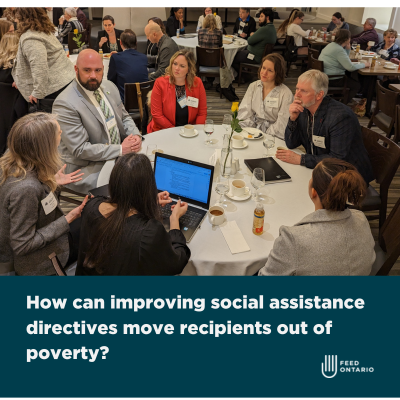
Discussion: We shared that two thirds of all food bank visitors are social assistance recipients who are relying on food banks to help fill the gaps caused by the insufficient support they receive through Ontario’s social assistance programs. The correlation between Ontario’s social assistance programs and food bank use is further outlined in the 2019 report Social Assistance Changes in Ontario: Forecasting the Impact of the Government of Ontario’s Proposed Reforms and in the 2022 Hunger Report.
Response: We provided key recommendations on how the Province could immediately improve Ontario Works and the Ontario Disability Support Program to ensure recipients have access to the support they need. Learn more about our recommendations to improve Ontario’s social assistance programs.
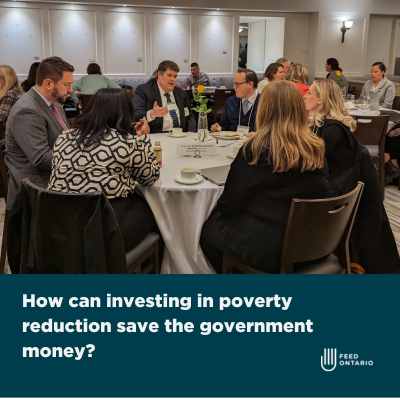
Discussion: We examined the early impacts of the Basic Income Pilot and how poverty rates declined in 2020 due to higher government transfers that year, including the enhanced Canada Child Benefit (CCB) and temporary pandemic relief benefits. In addition to looking at program costs associated with support benefits, the 2019 Cost of Poverty Report identifies that investing in poverty reduction would save the Province up to $33 Billion per year through significant savings in health and justice system expenses that communities, provinces, and nations incur by maintaining a portion of the population in poverty.
Response: We highlighted opportunities where government can turn their investments into cost savings opportunities and profits. Learn more about our policy recommendations to alleviate poverty in Ontario.
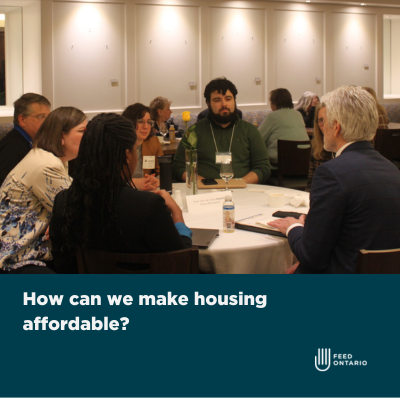
Discussion: We discussed the intersections between unaffordable housing, homelessness, and food security. The rising cost of housing and its impact on food security was profiled in Feed Ontario’s 2017 Hunger Report and, as a growing concern, remains a focus in our 2022 Hunger Report.
Response: We questioned the role of market housing and suggested that reforms are needed by all levels of government. Learn more about our recommendations for investment in affordable housing.
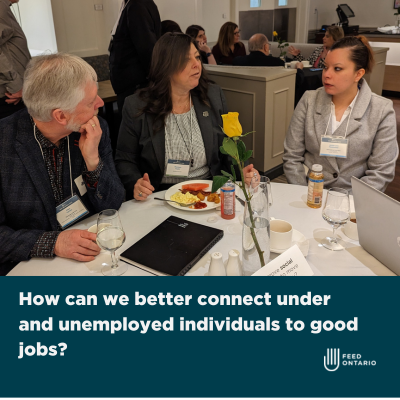
Discussion: We talked about the barriers that food bank visitors face when it comes to securing a good job, including the cost of working and requirements for training and education. The 2019 Hunger Report speaks to Ontario’s Changing Employment Landscape and Its Impact on Food Bank Use.
Response: We recommended key policy changes that the Province can make to improve the quality of work in Ontario, support those who are entering or re-entering the workforce, and ensure that all workers can access to a livable wage. Learn more about our policy recommendations to build a stronger workforce.
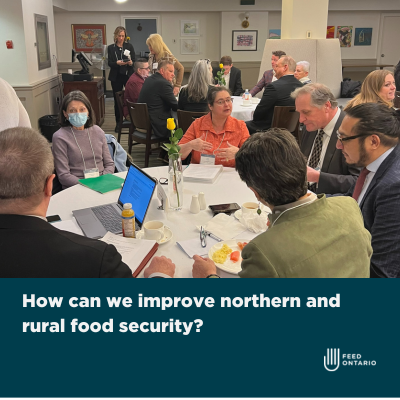
Discussion: We addressed the unique challenges faced in northern and rural areas like food deserts, ice roads, and infrastructure. Food banks shared how difficult it is to gain access to resources in smaller communities. Learn more about the challenges of moving food through Northern Ontario.
Response: We brainstormed potential short-term and long-term solutions to improve food security throughout northern and remote areas of Ontario and the importance of involving those with lived experience when exploring solutions and creating policy recommendations.
As a final nod to the important issues and work being done by Feed Ontario and our network of food banks, MPP Chris Glover asked Minister Merilee Fullerton (Children, Community, and Social Services) this question during Question Period:
“600,000 people accessed Feed Ontario food banks last year. Two-thirds of the people who access food banks rely on Ontario Disability Support Program or Ontario Works. The government has left food banks to deal with homelessness and hunger crises because they have refused to double ODSP and OW. Will this government do what is right and double ODSP and Ontario Works to ensure food banks are not left to deal with the homelessness and hunger crises in this province?”
The question and Minister’s response can be seen here: Question Period: (27:30 – 30:57)
Feed Ontario and our network of food banks will continue to meet and engage with MPPs across the province to share our insights and experiences into how we can work together to reduce poverty and the need for food banks.
